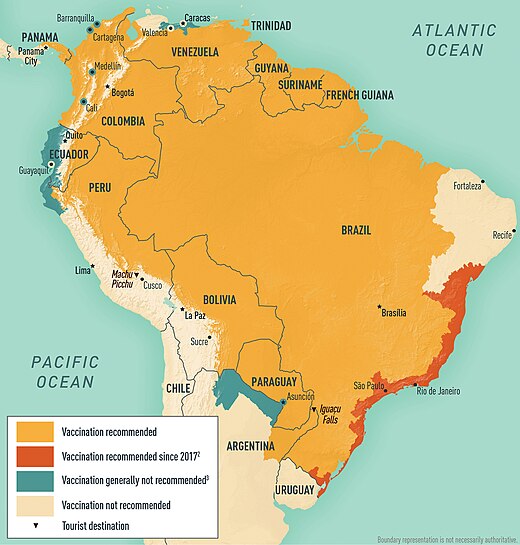Yellow Fever
Yellow fever is an acute viral disease that primarily affects tropical regions in South America and Africa. It is caused by the yellow fever virus (YFV), an RNA virus of the genus Flavivirus, and is transmitted mainly through the bite of infected mosquitoes, particularly Aedes aegypti.

Signs and Symptoms
Yellow fever typically has an incubation period of three to six days. Initial symptoms include fever, headache, chills, back pain, fatigue, loss of appetite, muscle pain, nausea, and vomiting. These symptoms usually resolve within three to six days. However, 15% of cases progress to a severe phase characterised by recurring fever, jaundice due to liver damage, abdominal pain, and bleeding from the mouth, nose, eyes, and gastrointestinal tract, leading to vomit that contains blood (vómito negro). In severe cases, the mortality rate can be as high as 50%.
Complications
Complications from yellow fever can include liver failure, bleeding, jaundice, fatigue, heart rhythm problems, seizures, and internal bleeding. The fatality rate among those who develop severe yellow fever is between 20% to 50%.
Cause and Transmission
Yellow fever is caused by the yellow fever virus, which is transmitted through the bite of infected mosquitoes, primarily Aedes aegypti.


Pathogenesis
The yellow fever virus replicates in the lymph nodes and infects dendritic cells before reaching the liver, where it infects hepatocytes indirectly via Kupffer cells. This leads to liver cell damage and the release of cytokines, which can cause severe inflammation and multiple organ failure.
Diagnosis
Diagnosis is often clinical, based on symptoms and travel history. Virological confirmation is necessary for mild cases and is done through reverse transcription polymerase chain reaction (RT-PCR) or virus isolation in cell culture. Serological tests can detect specific IgM or an increase in IgG titers, though they may cross-react with other flaviviruses. Liver biopsies can confirm inflammation and necrosis but are only recommended post-mortem due to bleeding risks.
Prevention
Prevention strategies include vaccination, mosquito control, and personal protective measures such as using insect repellent and wearing long-sleeved clothing. The yellow fever vaccine is highly effective, providing immunity within 10 days of administration and lasting for at least 10 years. Mass vaccination campaigns have been successful in reducing the incidence of yellow fever.

Treatment
There is no specific antiviral treatment for yellow fever. Management is supportive and includes hospitalisation, rehydration, and pain relief. Aspirin and other NSAIDs are avoided due to the risk of bleeding. In severe cases, intensive care may be necessary.
Epidemiology
Yellow fever is endemic in tropical areas of South America and Africa. An estimated 200,000 cases occur annually, with 90% of infections occurring in Africa. Recent outbreaks have highlighted the need for continued vaccination and mosquito control efforts.


History
Yellow fever likely originated in Africa and spread to the Americas via the trans-Atlantic slave trade. The first recorded outbreak in the New World was in 1647 in Barbados. Major outbreaks in the 18th and 19th centuries significantly impacted populations in the Americas and Europe, influencing historical events such as the Haitian Revolution and the construction of the Panama Canal.
Self-assessment MCQs (single best answer)
What is the primary vector for transmitting yellow fever?
What is the causative agent of yellow fever?
What is a characteristic symptom of severe yellow fever?
What is the incubation period for yellow fever?
Which diagnostic method is used to confirm mild cases of yellow fever?
What preventive measure is highly effective against yellow fever?
Who is known for proving that mosquitoes transmit yellow fever?
Which continent reports the highest percentage of yellow fever cases?
What is the fatality rate among those who develop severe yellow fever?
What is a common complication of yellow fever?
Dentaljuce
Dentaljuce provides Enhanced Continuing Professional Development (CPD) with GDC-approved Certificates for dental professionals worldwide.
Founded in 2009 by the award-winning Masters team from the School of Dentistry at the University of Birmingham, Dentaljuce has established itself as the leading platform for online CPD.
With over 100 high-quality online courses available for a single annual membership fee, Dentaljuce offers comprehensive e-learning designed for busy dental professionals.
The courses cover a complete range of topics, from clinical skills to patient communication, and are suitable for dentists, nurses, hygienists, therapists, students, and practice managers.
Dentaljuce features Dr. Aiden, a dentally trained AI-powered personal tutor available 24/7 to assist with queries and provide guidance through complex topics, enhancing the learning experience.
Check out our range of courses, or sign up now!


